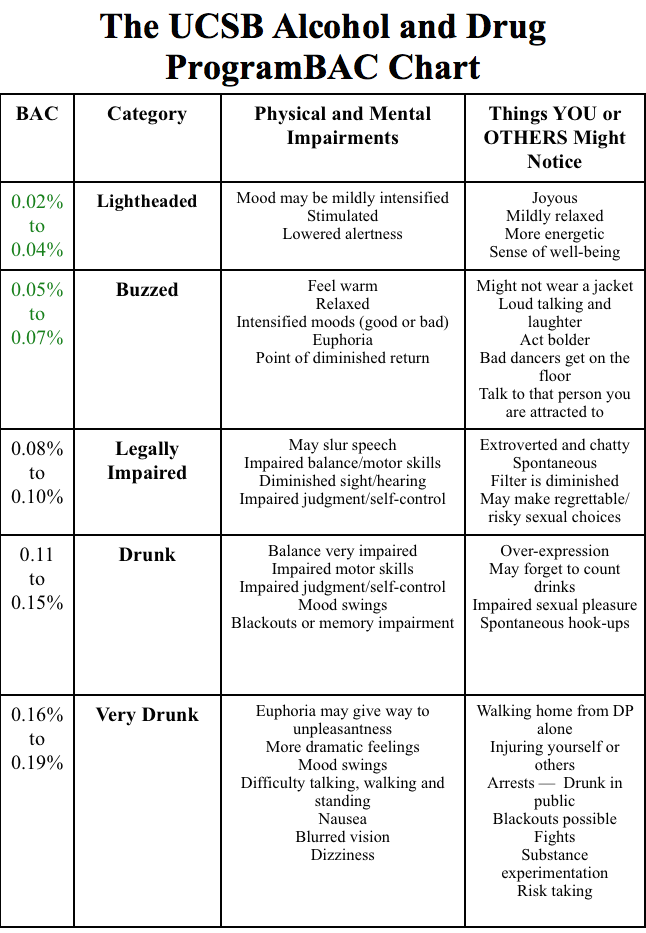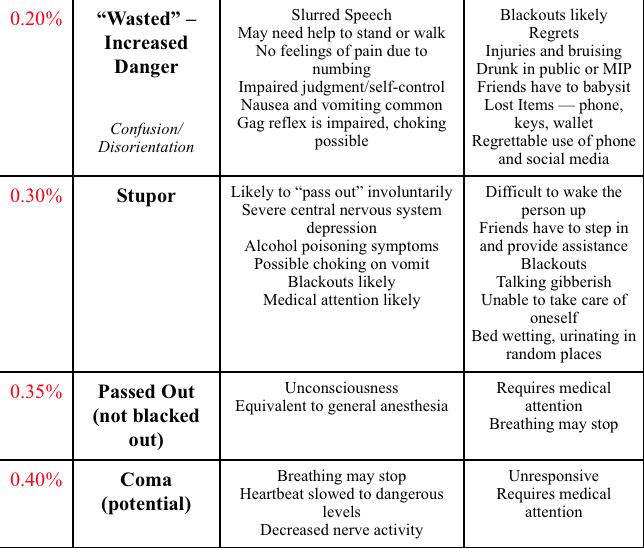
You can’t control a lot of things in your life, but you can control how your night goes if you choose to drink by becoming more aware of your BAC (Blood Alcohol Concentration). At the UCSB Alcohol and Drug Program, counselors educate students by integrating evidenced-based alcohol education and teaching risk reduction skills that are relevant to college students.
“My BAC card is wrong” is a claim often made by students who are learning about Blood Alcohol Concentration and trying to figure out how it applies to their drinking. Learning about your BAC is the ultimate strategy for reducing negative consequences that may be associated with high risk drinking. Higher BAC numbers can lead to unfortunate incidents involving physical and sexual assault, unsafe sex, regrettable sex, academic problems, mental health problems and interactions with law enforcement.
According to Dr. Jackie Kurta, Director of the UCSB Alcohol and Drug Program, “Some people may feel that we are ‘teaching our students to be better drinkers.’ … Perhaps in some ways this is accurate. While we don’t encourage underage drinking and/or use of illegal substances, we are quite clear that students will choose to drink and use despite the potential risks. We always reiterate the laws, and the potential for personal consequences involved with alcohol and drug use. Our goal is to educate students about ways to be safe and responsible, and to carefully consider their choices. … If this can make them smarter and more responsible drinkers, then we’ve done our job.”
QUESTION: What is Blood Alcohol Concentration?
Blood Alcohol Concentration is a way of measuring the amount of alcohol present in your blood and it can help determine the effects alcohol will have on your brain, body and behavior. Numerous factors contribute to accurate BAC reporting including sex, weight, ethnicity, food intake, emotional state and medications. BAC can be calculated by breathalyzer, urinalysis and blood test and BAC can be estimated by use of BAC cards. If you would you like a BAC card stop by the Alcohol and Drug Program offices on the second floor of Embarcadero Hall in Isla Vista and get one for free!
QUESTION: Aren’t Tolerance and BAC the Same Thing?
Nope. Tolerance is the brain’s adaptation to repeated use of a substance so that the person no longer responds to the drug in the same way that they may have responded previously. Simply stated, as your tolerance increases, it takes more of a substance to achieve the same effect … and in some instances this may lead to more risky ways of using the substance as well.
Tolerance vs. BAC:
Tolerance is indicated by how you may FEEL while under the influence of substances. BAC is the ACTUAL percentage of alcohol in your blood, and this calculation is independent of changes in tolerance. You may not feel the effects that are shown on the BAC chart because of a developed tolerance, but your risk clearly increases as your BAC rises.
When estimating your BAC, here are some things to consider:
-How many drinks did you REALLY have?
This is the most important piece of the puzzle. You really need to “count” EVERY drink you consume in order to have an accurate BAC. Download an app on your phone to help you count! A free BAC calculator is brought to you by UCSB Life of the Party at: lifeoftheparty.sa.ucsb.edu
-How strong is your drink?
Not all types of alcohol are created equal. Mixed drinks typically have more alcohol because there are usually numerous “drink equivalents” in one mixed drink (e.g. a Long Island Iced Tea is not one drink …). And liquor can vary in strength; even beer has varying levels of alcohol. Get educated on what you are drinking before you take a sip.
-Pace. It is not a Race.
Really pay attention to when you have your first and last drink. Space them out.Drinking fast can more easily lead to blackouts. If you take a break from drinking and then go back to it, you may still have alcohol in your blood, so keep in mind you might not be starting from zero.
-Was it five o’clock somewhere?
Although BAC percentage can shoot up rapidly, it drops slowly. The duration of time you have been drinking is very important in determining how much alcohol is present in your bloodstream. Pre-gaming factors into your night even if it was done a few hours before you go to another event. Although you can decide how fast alcohol goes into your body, your body decides how fast it is eliminated from your system. Sobering up takes a lot longer than you might think.
This can explain why people feel lousy even late in the afternoon the next day. Hangovers can last a long time.
-Having trouble remembering your night?
We get it … people make mistakes and drink too much sometimes, but contrary to popular belief, blackouts don’t happen to everyone and they are not a normal by-product of drinking. Blackouts actually involve any kind of memory loss, including the gaps where you don’t remember the walk home, or how you bought nachos at Freebirds, or how you lost your keys, or worse. Blackouts are a result of drinking too much, too fast, leading to a rapid rise in BAC and your brain’s inability to store new memories. Be in control of your BAC: It makes blacking out totally preventable.
Healthy Drinking Habits:
-Pace yourself and keep track of how much you are drinking.
-Know the strength of your alcoholic drink(s).
-Be aware of the size of the container that holds your beverage.
-Stop when you reach a good limit for yourself, and remember: This may be a way different limit than your friends’ safe limits.
-Respect your body by getting familiar with your BAC safety, and if necessary, make the changes that are necessary in order to have fun and enjoy yourself.
If this information is helpful and you want more, contact The UCSB Alcohol and Drug Program at http://alcohol.sa.ucsb.edu or 805-893-5013 and come by anytime to pick up a BAC card. As our Life of the Party peers like to say: We GAUCHO BACK!
Lacey Peters, Marriage and Family Therapist, is a counselor at the UCSB Alcohol and Drug Program.
Kirt Sandhu is a third-year Financial Mathematics and Statistics major and student staff member at the UCSB Alcohol and Drug Program.
Jackie Kurta, Psy.D, MFT, is the Director of the UCSB Alcohol and Drug Program.


















